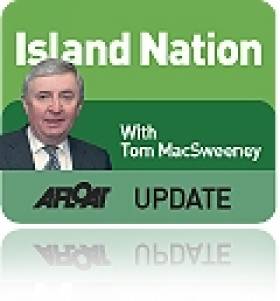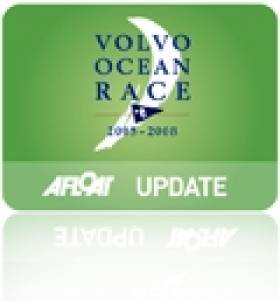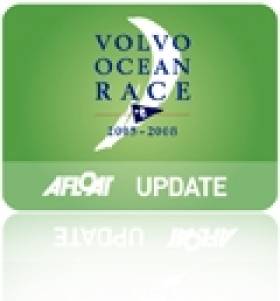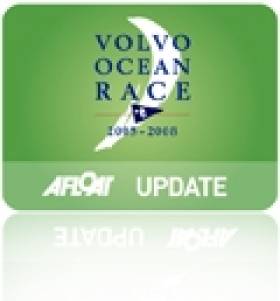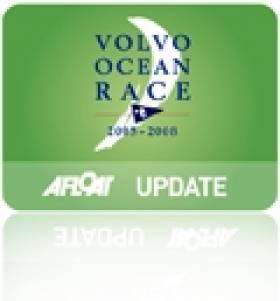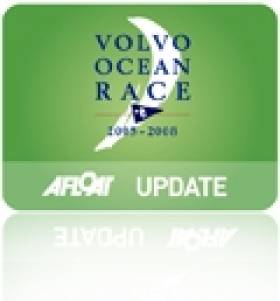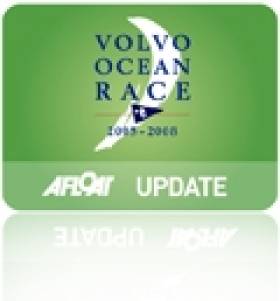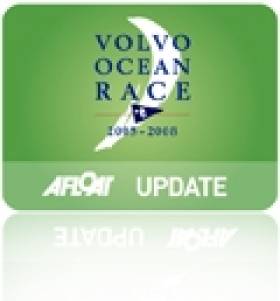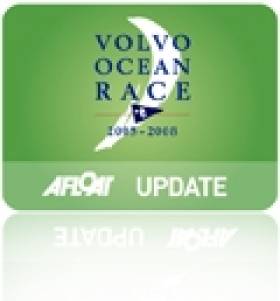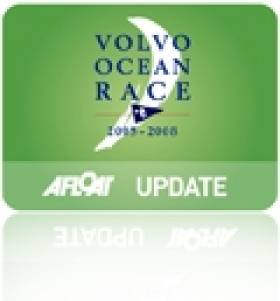Displaying items by tag: Volvo Ocean Race
#vor – As the Volvo Ocean Race organisers release the investigation report into the Team Vestas Wind shipwreck in the Indian Ocean, Irish sailor Brian Carlin who was the yacht's Onboard Reporter describes dramatically on the current edition of THIS ISLAND NATION just what happened and how he survived.
"It wasn't what I signed up for in the round-the-world race. We only managed to get 15,000 miles before that night, but it has been character-building. I have learned a lot from it," he says in the interview as he describes how he was hurled forward into a bulkhead :
"I was thrown several metres, banged my head off the forward bulkhead and was stunned. I thought at first that we had hit either a floating container or a whale, but it was a chain of reefs in the Indian Ocean. I got up on deck and saw that we were in serious trouble. It was night time, dark, but there was white water crashing everywhere around the boat and we were lodged on a rock. We stayed six or seven hours on the boat. The Skipper wanted to keep us together which was the right decision, but it was tough going, we were thrown back and forth and the yacht took a heavy battering and it was all in the darkness, the only lights being the personal ones we had. It was a frightening experience to survive and the darkness made it even more so. About half-three in the morning that became too dangerous. There was about six feet to what looked like a safe piece of rock. We deployed the liferafts where we could get some protection for them on the side away from the rocks, but we had to get onto that piece of rock first to be safe. One crew member went across there first, with a rope tied around him and then the rest of us got onto it.
We clung onto that rock until daylight came up and then it was amazing to see that we were in a lagoon area which itself looked beautiful and was in the middle of the ocean."
Were you frightened at any stage that you might not survive, that you could die, I asked him?
"I was. There were two very bad moments. Initially I was a bit shocked. When we were waiting on the boat for daylight, I was afraid that it might overturn on us and we would be trapped. When we were getting off the boat onto the rock I really didn't want to leave it because you were going into the water to try to swim towards rocks which were being battered by waves and it looked like you could be battered too. But that piece of rock was the only place to be safe. The boat was no place to survive. I didn't want to do it, but I had to."
That night in the darkness they did not see sharks, but the following morning when daylight came up, they saw five or six within a hundred metres of the boat.
• Tune into Ireland's niche radio programme above and hear Brian's first-hand account of his experience and the advice he gives to all sailors to take careful notice of the safety recommendations from the RNLI
Also on the programme, the RNLI explains why the organisation is excited about the arrival of the first Shannon Class lifeboat to Lough Swilly and, continuing the explanation of nautical terms for landlubbers, the programme explains why sailors use 'port' and 'starboard' instead of 'left' and 'right'.
Team Vestas Wind Was 'Unaware Of Any Navigational Danger' Before Grounding Says Report
#VOR - Team Vestas Wind "was unaware of any navigational danger, in its vicinity, incorrectly assessed the minimum chart depth at Cargados Carajos Shoals to be 40 metres and understood that it was safe to sail across the shoals."
That's how the panel conducting the independent report into the grounding of the Danish team's yacht in the Indian Ocean on the second leg of the Volvo Ocean Race summed up the situation that led to the incident.
As the official VOR website reports, the results of the investigation were published today (Monday 9 March) and were based on data recorded at the time of the grounding plus interviews with the crew, race management and other parties.
Despite navigator Wouter Verbraak stepping down from the team earlier this year, the investigative panel – comprising Rear Admiral (Rtd) Chris Oxenbould (chair), Stan Honey and Chuck Hawley – did not single out any individuals for blame, but did note that there were "deficiencies in the use of electronic charts and other navigational data" on board the vessel, currently under repairs in Italy with plans to rejoin the race for the final leg this summer.
There were also "deficiencies in the cartography presenting the navigational dangers on the small and medium scales of the chart system in use."
However, the report said the team's emergency management in response to the grounding "worked well and there were no administrative or race management issues that contributed to the incident."
The VOR website has much more on the story HERE.
Foxall Joins China's Volvo Ocean Race Dongfeng Team
#vor – County Kerry's Damian Foxall, one of the biggest names in offshore sailing, is joining the Dongfeng Race Team (Charles Caudrelier/FRA) for the forthcoming treacherous Leg 5 of the Volvo Ocean Race.
Caudrelier and Foxall were on the Groupama boat that won the 2011-12 edition. The Irishman was the natural choice when Dongfeng's skipper looked for an experienced sailor to bolster his line-up for the 6,776-nautical mile (nm) stage from Auckland to Itajaí, Brazil, through the Southern Ocean and round Cape Horn.
Foxall, who has competed in four previous Volvo Ocean Races, arrived in Auckland fresh from victory in the EFG Sailing Arabia – The Tour (SATT), sailing with the renowned French sailor, Sidney Gavignet. He said on Thursday that he was thrilled to link up again with Caudrelier, who has guided his China-backed team to joint top of the current race standings.
"I am delighted to be back 'in the saddle'. This will be the 10th round-the-world event that I will be involved in and my eighth rounding of Cape Horn," he said. "It is a privilege to have the opportunity to join Charles and the boys onboard Dongfeng who have been doing such an exemplary job. My role is to fit in as seamlessly as possible and to bring the benefit of a fresh person to the team.
"It is hard to overstate the difficulty of the Volvo Ocean Race for the sailors and teams, the longest sporting event in any sport, and it is exactly this, the duration, that makes it so hard. A planned rotation of the crew at key times has become a crucial part of any successful team's strategy."
Caudrelier agrees. "This leg is going to be a tough, freezing cold, with big seas and strong winds – only the toughest sailors can endure it," he said.
Foxall could not be joining the race at a more challenging time. The first three boats finished the 5,264nm Leg 4 within just over eight minutes of each other after 20 days at sea with MAPFRE (Xabi Fernández/ESP) becoming the fourth team to win a leg.
Dongfeng Race Team won the second leg into their home port of Sanya from Abu Dhabi in January.
Foxall will replace Thomas Rouxel (FRA) on this leg, continuing the crew rotation programme set by Caudrelier to ensure his eight-man crew are fighting fit and bringing fresh energy into the team.
Navigator, Pascal Bidégorry (FRA), is back and will undoubtedly find the Southern Ocean leg less painful than being rested on land as he was for Leg 4. Caudrelier has yet to confirm which of his Chinese sailors will sail in the forthcoming stage.
The crew will be announced next week for the leg, which sets off on Sunday, March 15.
Damian Foxall's four Volvo Ocean Race appearances
2001-02 (Tyco)
2005-06 (Ericsson)
2008-09 (Green Dragon)
2011-12 (Groupama sailing team)
Spanish Win Latest VOR Leg As Top 3 Finish Within 8 Minutes
#VOR - MAPFRE have crossed the line at Auckland to take victory in the fourth leg of the 2014-15 Volvo Ocean Race, just minutes ahead of their closest rivals Abu Dhabi Ocean Racing – with Irish bowman Justin Slattery among her crew – and Leg 3 winners Dongfeng Race Team.
Indeed, only eight minutes separated the three yachts as they sailed into the Viaduct Harbour in New Zealand's largest city just over an hour ago. And Team Alvimedica were not far behind, crossing the line within the last few minutes.
What's more, there's still a battle to escape last place, as Team Brunel and Team SCA were just nine nautical miles apart according to the most recent live tracker update.
"Today is a very good day for the team!" said MAPFRE skipper Xabi Fernandez as his boat and crew reached the finish line at 9.31pm local time.
And there were no hard feelings from second-place Abu Dhabi, with skipper Ian Walker saying he was "very pleased for Xabi" after "a very, very exciting finish, and a few nerve-wracking days."
The result marks an incredible change in fortunes for the Spanish team, who finished dead last in Cape Town after the first leg but steadily improved their form as the fleet traversed the Indian Ocean and the South China Sea towards the Pacific.
The Volvo Ocean Race website has much more on the story HERE.
Who Will Get Birthday Surprise in Volvo Ocean Race?
#vor – Birthday boys Charles Caudrelier and Ian Walker were planning to dampen each other's celebrations as Leg 4 of the Volvo Ocean Race continued to go down to the wire on Friday.
Abu Dhabi Ocean Racing (Walker/GBR) held a tiny 7.3-nautical mile (nm) advantage at the head of the fleet at 0040 UTC with Dongfeng Race Team (Caudrelier/FRA) and MAPFRE (Xabi Fernández/ESP) leading the chasing pack.
The leading trio have around 300nm still to sail to complete the 5,264nm leg from Sanya to Auckland and are expected to arrive in the port known as the 'City of Sails' on New Zealand's North Island around 2100-2400 local time on Saturday/Sunday (0900-1200 UTC).
Walker celebrated his 45th birthday on Thursday and Caudrelier his 41st a day later, but neither was in the mood to celebrate anything just yet although the Frenchman had a double reason to mark the day – Dongfeng Race Team's Volvo Ocean Race campaign was launched exactly a year ago as well.
Instead, they were desperately trying to eke out some kind of advantage before the nail-biting final day. It's a leg which has seen the fleet sail through the South China Sea from February 11 and battle all the way through the Pacific Ocean, exchanging the lead on several occasions.
According to Caudrelier, arch-rival Walker has so far received the better of the gifts from the weather gods in the last 24 hours.
"This morning I woke up a 41-year-old onboard this boat, leading Leg 4 of the Volvo Ocean Race" he wrote in his daily blog from the boat. "I'm spoiled.
"Yesterday, it was Ian Walker's birthday; we exchanged some nice, fun emails about our receptive gifts. Tonight we've been the victims of a cruel squall, which destroyed in 30 minutes the three days of effort we've made to catch up and overtake Ian and his men.
"Without wind for 30 minutes, we went backwards against the swell while Azzam sped up to 18 knots, three miles from us.
"That was his gift. I'm waiting for mine before the end of the leg."
The pair look destined to be the closest of rivals throughout the nine-month, 38,739nm race, which will be decided over nine legs in all before the conclusion in Gothenburg, Sweden on June 27.
They are currently one point apart after three stages with Leg 3 winners Dongfeng Race Team narrowly holding the upper hand. It is by no means, however, a two-horse race – or leg.
MAPFRE (Xabi Fernández/ESP) could well be cast in the role of party spoilers on Saturday night. They lay just 0.7nm behind Dongfeng Race Team and were quite capable of catching one, if not both, of the leading boats and claiming their first leg win of the race.
Team Alvimedica (Charlie Enright/USA), Team Brunel (Bouwe Bekking/NED) and Team SCA (Sam Davies/GBR) looked likely to be contesting the minor placings (see panel above) although a late, windless 'park-up' near the finish could yet lead to a surprise.
Auckland is no stranger to thrilling finishes – there are still strong memories here of the 1989-90 race's showdown between Peter Blake's Steinlager 2 and Grant Dalton's Fisher and Paykel, which the former won in the last couple of nautical miles.
New Zealand Prime Minister, John Keys, was among the many who are looking forward to the conclusion of such a memorable leg.
He opened the Race Village on Friday after the local Maori people, the Ngāti Whātua Ōrākei, officially 'loaned' the Auckland Viaduct Basin area to Race CEO, Knut Frostad.
"Lots of families and friends will come, lots of tourists will come. To have come all the way from China on such a long leg and to have such a small gap separating the teams shows you how well matched they are. And that makes it really exciting," said Keys.
Less than 60nm Separates Six Volvo Ocean Race Yachts
#volvooceanrace – Victory in the fourth leg of the Volvo Ocean Race was so close that Dongfeng Race Team skipper Charles Caudrelier (FRA) could almost taste it on Thursday, but with just over 500 nautical miles (nm) to go, he was taking nothing for granted.
The fleet is expected to arrive at their destination, Auckland, on New Zealand's North Island, on Saturday afternoon local time after 20 days of head-to-head racing.
Rarely in the 41–year history of offshore racing's world event can such a long leg (5,264nm) have been so closely contested by the entire fleet.
Just 51.8nm separated leaders, Dongfeng Race Team, from the last-placed boat, Team SCA (Sam Davies/GBR), and with light winds expected in the final stretch, there was every possibility that the fleet could bunch even closer together.
Caudrelier's crew, victors in the previous leg from Abu Dhabi to Sanya, were pursued by Abu Dhabi Ocean Racing (Ian Walker/GBR), just 3.5nm in their wake, with MAPFRE (Xabi Fernández/ESP) still holding third spot, 12.3nm in arrears (0340 UTC).
Team Alvimedica (Charlie Enright/USA) led a second pack of three boats, 33.7nm behind the leaders, with Team Brunel (Bouwe Bekking/NED) and Team SCA chasing them (see panel above).
In a message from his boat, Caudrelier wrote: "Since last night, we re-took the lead again and with it, the pressure of being in front.
"To be in the lead after all the hard knocks we've taken on this leg is without doubt one of our team's proudest moments since the start of this race (on October 11 last year).
"We've had really hard moments, phases of total exhaustion, and moments of real frustration and anger, but onboard there is always someone ready to motivate the others, someone with a positive outlook."
The Chinese team's success so far has been all the more extraordinary for bouncing back from a partially disconnected mast track, which attaches the mainsail to the mast, a week ago.
The Dongfeng crew dropped back to last place while it was repaired, but within 48 hours had picked off the rest of the six-strong fleet, one-by-one, to claim the lead.
Caudrelier continued: "I'm looking forward to the next few days. The two main obstacles are the crossing of an old weather front in 24 hours' time, and the finish, which looks light. I'm not sure yet whether it's upwind or downwind, it's not clear.
"It could be a total restart, but I am really hoping that if it is, it's between the current top three. The other boats are now quite a long way back, but anything could happen still."
Abu Dhabi Ocean Racing's skipper Walker agreed: "I expect local winds and currents could decide our fate towards the end and it is very hard to imagine anything other than a very, very close finish.
"Until then, we continue to work on our speed and try to get ever closer to Dongfeng."
Walker's team were just one point behind Dongfeng Race Team in the overall standings after three legs of nine. In all, the race will cover 38,739nm, visiting 11 ports and every continent, finishing in Gothenburg, Sweden, on June 27.
Chinese Volvo Ocean Race Leaders Hit By Mast Problem
#vor – China's Dongfeng Race Team (Charles Caudrelier/FRA) were in no mood to celebrate Chinese New Year on Wednesday after being relegated to the back of the fleet for the first time since the Volvo Ocean Race 2014-15 started.
Caudrelier's crew entered the 5,264-nautical mile (nm) Leg 4 from their home port of Sanya to Auckland as overall leaders by a single point, following victory on the previous stage.
However, the crew have been struggling to re-establish their grip on the fleet and the latest setback was a problem with their mast track, which has broken free in one area. The track attaches the mainsail to the mast.
This is the third time this issue has hampered the team during the race. They have made a temporary fix with lashings to secure the track to the mast, but will want to make a more permanent repair as soon as they reach lighter winds in the middle of the Pacific Ocean.
Dongfeng's French skipper Caudrelier was already not in the best of humours after opting against a more northerly route towards Taiwan, early in the leg, after exiting the Luzon Strait.
One of his biggest rivals for the overall prize, Bouwe Bekking of Team Brunel (NED), left Dongfeng Race Team in their wake after deciding to take that navigational gamble, and on Wednesday, the Dutch boat still led the fleet by just under 50nm.
"I was too conservative," Caudrelier later conceded.
Chinese sailor, Yang Jiru (English name 'Wolf'), summed up the subdued atmosphere on board his boat on Tuesday night: "The condition we are in is not ideal at all, that's why everyone's disappointed and also a bit upset. We are all focusing on the race and therefore don't have much desire to celebrate the Chinese New Year.
"It's just that we're not really in the mood to celebrate. The race is still very intense, especially since we are falling behind a lot at the moment. The only wish I have is to make a 'phone call with my family at midnight.
"But if you ask me if I have any doubt (about what I'm doing), the answer is no, I don't feel any regret."
Despite the glum mood, Dongfeng Race Team were certainly not out of contention altogether for good leg points (1 for first, 6 for last), with some 2,700nm left to sail before reaching their destination in New Zealand. At 1010 UTC, they had managed to cut 38nm off Team Brunel's lead in the previous three hours and trailed by just 77nm.
Fifth-placed Team SCA (Sam Davies/GBR), who had also taken the 'northern route' with Brunel on this leg, but without making the same gains as the Dutch team, were powering along just 61.1nm behind the leaders.
Abu Dhabi Ocean Racing (Ian Walker/GBR) were tucked into second place, 28.4nm behind Bekking's crew, while Team Alvimedica (Charlie Enright/USA) were making the most of their consistently good boat speed, 14.8nm further adrift in third.
The pair had finished second and third in Sanya last month respectively, with Team Alvimedica securing their first podium finish in a race which has shown a steady improvement for them throughout.
MAPFRE (Xabi Fernández/ESP), in fourth, 54.8nm behind, had one major cause for cheer – they have fixed, with the collaboration of Cobham and Race HQ, for their time being at least, a problem with an antenna and so have restored full communications with Race Control.
This means that they too can receive all the weather data, the same as the other teams in the fleet. Prior to that, they had been sailing 'blind' since Saturday evening, unable to plot the optimum course based on the in-depth weather forecasts they were missing.
The fleet is due to arrive in Auckland in around a week's time on February 28-March 1.
Chinese Volvo Ocean Race Boat Cheered on by Huge Sanya Crowds
#vor – Dongfeng Race Team (Charles Caudrelier/FRA) have dominated the Volvo Ocean Race ever since they entered their home waters in Sanya last month, and today marked no change despite four swaps in their crew line-up for Leg 4 to Auckland.
They won the stage from Abu Dhabi and then followed up on Saturday with a faultless win in the In-Port Race here.
Caudrelier's men raced clear of the six-strong fleet virtually from the starter's gun on Sunday and exited the bay of Sanya first, cheered on by the usual enthusiastic crowds here on leg departure day.
However, there was still a long, long way to go on a treacherous stage to New Zealand's 'City of Sails', and they soon lost their slim early advantage to Team Brunel (Bouwe Bekking/NED).
The fourth stage to Auckland, a distance of some 5,264 nautical miles (nm), is probably the toughest so far in terms of the sea conditions the fleet will meet, especially in in the South China Sea, when they head towards the Philippines.
Dongfeng have rested four of the sailors who saw them victorious in their home port in the previous leg from Abu Dhabi to Sanya. Martin Strömberg (SWE), Erwan Israel (FRA) and Chinese pair Yang Jiru (English name 'Wolf') and Chen Jin Hao ('Horace') step in.
Caudrelier's toughest call was to go ahead with the pre-race plan of resting Pascal Bidégorry (FRA), his long-time mentor, with Israel taking his role of navigator for Leg 4.
Israel certainly doesn't lack experience in the race after winning the previous edition as part of the Groupama crew.
That is more than can be said of Alex Higby (GBR), who was awakened at 0700 local time on Sunday, to be told to stand by for his first taste of Volvo Ocean Race duty on board Abu Dhabi Ocean Racing (Ian Walker/GBR).
He is stepping in for Azzam's Emirati sailor, Adil Khalid, who has been forced to pull out at the 11th hour because of a vomiting bug.
"I know Adil is devastated to have to miss Leg 4 and I have wished him a speedy recovery," said Higby, who has been a member of Abu Dhabi Ocean Racing's shore crew in the sail loft.
"I haven't had much time to think about the significance of getting the call-up from Ian, but I'm of course very excited to get the chance to sail in my first Volvo Ocean Race leg," he added.
The pressure will be on the newcomer from Poole, Dorset in England. His team trail Dongfeng Race Team by just one point after three of the nine legs of the nine-month, 38,739nm marathon.
But it's by no means a two-team race. So far, there have been three separate winners of the first three legs and Leg 2 winners, Team Brunel (Bouwe Bekking/NED), are still in contention despite a disappointing fifth place Leg 3 finish.
Team Alvimedica (Charlie Enright/USA), the youngest crew in the race, are feeling bullish after claiming their first podium finish with third spot on Leg 3, but MAPFRE (Xabi Fernández/ESP) and Team SCA (Sam Davies/GBR) both have points to prove after failing so far to reach their potential on the offshore stages.
The boats are forecast to arrive in Auckland in roughly three-and-a-half weeks at the beginning of March.
Winds Of Up To 30 Knots Forecast For Sanya Departure
#vor – Volvo Ocean Race's six-strong fleet heads out towards Auckland from Sanya for Leg 4 on Sunday with some big calls to make in the latest instalment of a marathon offshore contest.
Charles Caudrelier's (FRA) Dongfeng Race Team have their noses in front by a single point after the stage from Abu Dhabi to Sanya, but know that they could so easily follow the example of Team Brunel (Bouwe Bekking/NED), who could only muster fifth place on the leg to China after winning the previous one.
The Chinese team, which became the first from the world's most populous nation to win a leg in the 41-year-old race last month, have yet to announce their crew plans for the 5,264-nautical mile trip to Auckland, New Zealand.
These will be unveiled on Friday (February 6) and it will be fascinating to see how many changes they make to a crew which is performing so surprisingly well.
Chris Nicholson (AUS) and several members of the Team Vestas Wind crew, whose boat was badly damaged on a reef in the Indian Ocean on November 29 during Leg 2, will watch the departure in Sanya.
The skipper from Lake Macquarie, New South Wales, reported on Thursday that Vestas Wind had arrived at the Persico yard in Bergamo, Italy, and the first stages of the rebuild were now underway with a hoped-for return to the race in June.
Meantime, the latest round of the In-Port Race Series - this one named the Team Vestas Wind In-Port Race - will be held on Saturday with Team SCA (Sam Davies/GBR) aiming to continue their good form following victory in Abu Dhabi.
#slackline – In his most creative stunt yet, Mich Kemeter does a slackline above the sea – using two Volvo Ocean Race yachts!
When you're 27 meters up in the air, the wind whistling past your ears and gravity pulling heavy at your limbs, there's only one thing to do: walk the line. That's what Austrian professional slackline walker, Kemeter, did on December 28 at the Volvo Ocean Race stopover in Abu Dhabi. Except he didn't quite make it....



























